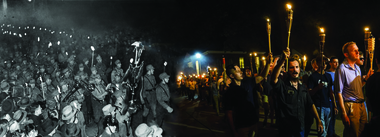The swastika uprising in America

by Rob Howard
Associate Editor
“One of the most powerful themes of the Nazis was German nationalism - Germany first, Germans first – make Germany great again!” Michael Korenblit, author, and son of two Holocaust survivors told The Gayly.
Korenblit said it sounds familiar. He expressed his concerns since the 2016 presidential campaign, events since the inauguration of President Trump and the white nationalist demonstration in Charlottesville, Virginia in August.
“The Nazi Party and Adolf Hitler came to power legally,” said Korenblit. “While they only got 33 percent of the vote it was enough for them to combine with other right-wing parties to take over the government.”
He talked about the Nazis’ first actions: going after the opposition, after minorities like Jews and homosexuals and the media.
Rebecca Ungerman from Tulsa, said, “The rights of Jews and other groups targeted by the Nazis were not stripped away at one sitting. It was insidious and happened over time.”
She’s not just studied the Holocaust. “In 2004, I participated in The March of The Living, an annual march in Lodz, Poland, from Auschwitz to Birkenau, in addition to visiting several other camps in Poland. The recent events in our nation are horrifying.”
Korenblit agrees. “To say I am very disturbed would be an understatement!” He cites the increase in anti-Semitic incidents, which rose 34 percent from 2015 to 2016 and increased 86 percent in the first three months of 2017.
“But probably the most disturbing incident happened in August of this year in Charlottesville at an Alt-Right and white nationalist march where they had a Nazi torch march chanting, “Jews will not replace us” and the Nazi slogan, “Blood and Soil.”
President Trump’s statement, “there was wrongdoing and ‘fine people on both sides,’ scares me,” said Ungerman. “Like many Jews, I have always had a heightened sense of anti-Semitism in the world, especially in the U.S.”
Neither of the two thinks the press, public and politicians understand the parallels to the rise of the Nazis in Germany. “Joseph Goebbels, the Nazi propaganda minister, first termed the famous quote, ‘the more you tell a lie, the more people will begin to believe it,'” Korenblit said.
He points to the president and his administration’s calling anything the media reports “fake news.” The more they use that term, “[the] more and more people question what is true and what is not.”
The problem appears to be even deeper, Ungerman believes. “I think there are people in all three of those groups who do understand the parallels. But I don't know that those people are taking these things seriously enough or being loud enough about what they believe.
“If you say it's a small leap from torch-wielding hate groups marching and shouting to those same people committing mass murder, that's an unpopular thing to say. It's also what happened during the Holocaust.”
While both are alarmed by current events, they express hope. Korenblit’s parents survived because three Christians risked their lives and ultimately died for protecting them. “I found the son of one of those heroes, and I asked him why his father risked his life to save my parents. His answer was, ‘because he knew it was the right thing to do.'
“That is why I still have hope and faith in this country and its people. Just like that brave Christian, I know we will do the right thing and turn this around.”
Ungerman leaned more toward activism: “We live in a world where 'Antifa' is apparently a person who is a radical anti-fascist.
“Shouldn't we all be?”
The Gayly 1/27/2018 @ 2:29 p.m. CST





